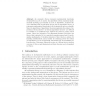2338 search results - page 72 / 468 » Separation in Theory - Coordination in Practice |
MKM
2007
Springer
15 years 4 months ago
2007
Springer
An axiomatic theory represents mathematical knowledge declaratively as a set of axioms. An algorithmic theory represents mathematical knowledge procedurally as a set of algorithms....
IJCAI
1993
14 years 11 months ago
1993
The Dempster-Shafer theory gives a solid basis for reasoning applications characterized by uncertainty. A key feature of the theory is that propositions are represented as subsets...
LPNMR
2005
Springer
15 years 3 months ago
2005
Springer
The formalism of nonmonotonic causal theories (Giunchiglia, Lee, Lifschitz, McCain, Turner, 2004) provides a general-purpose formalism for nonmonotonic reasoning and knowledge repr...
JAPLL
2008
14 years 10 months ago
2008
Simple type theory, also known as higher-order logic, is a natural extension of first-order logic which is simple, elegant, highly expressive, and practical. This paper surveys th...
140
click to vote
TSP
2008
14 years 10 months ago
2008
We study a sampling setup where a continuous-time signal is mapped by a memoryless, invertible and nonlinear transformation, and then sampled in a nonideal manner. Such scenarios a...

